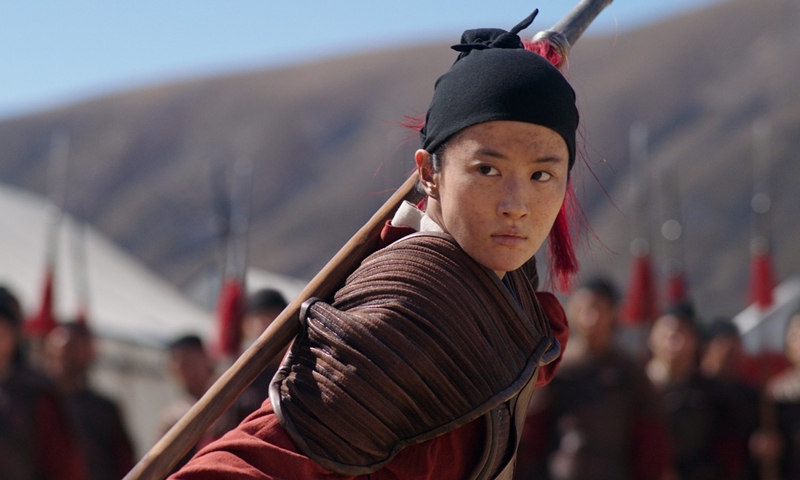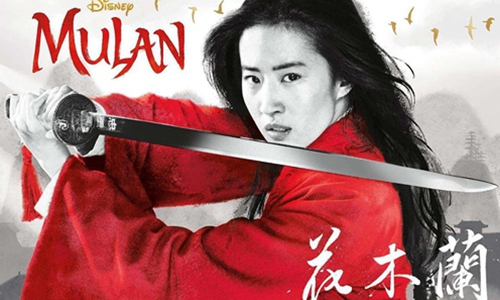ARTS / FILM
Poor artistic level, misunderstanding of Chinese culture lead to Mulan failure in China
Disney’s Mulan story fails to win Chinese audience

Mulan Photo:VCG
Disney's new Mulan, an action drama based on a centuries-old traditional Chinese story, made its debut in the Chinese mainland on Friday. Though starring popular Chinese actors, the film received a cold shoulder due to its self-righteous depiction, which failed to resonate with Chinese audiences.
As of 9 pm, Mulan raked in 48 million yuan ($7 million), real-time box office monitoring platform Maoyan showed. Maoyan forecast that Mulan's total box office in the Chinese mainland could reach 291 million yuan, compared to the spy film Tenet's 406 million yuan and Chinese war epic The Eight Hundred's 2.91 billion yuan.
With COVID-19 under control, Chinese theaters have been gradually reopening. Domestic and overseas films are lining up to be screened after months of delays. Among the first batch of films, The Eight Hundred grossed 141 million yuan on its first day, with projected box office receipts 10 times that of Mulan.
This was not the first time that Disney tried to film the Chinese story. The previous animated version had introduced the Chinese character to the world. As a live-action adaptation of the animation version, it had been attracting attention even before being screened.
With high expectations, its word-of-mouth, however, has been unexpectedly declining. It scored 4.7 on Chinese movie review platform Douban, comparing to Tenet's 7.8.
Shi Wenxue, a film critic, told the Global Times on Friday that the poor box office performance of Mulan in the Chinese mainland is not surprising because it failed to tell a Chinese story in an accurate and attractive manner.
The movie is just a mixture of oriental elements and symbols in the eyes of Westerners. "For instance, in the film, Mulan from the Northern Wei Dynasty (386-534) lived in the earth building - a type of construction using raw earth invented during the Song Dynasty (960-1279). The general in the movie played Taichi - which was created in the Yuan Dynasty (1279-1368)," Shi said.
"It also blended conventional settings of traditional Western fairy tales incompatible with Chinese historical stories. Disney failed to do enough research on non-Western elements and stories. That led to many silly mistakes in the movie," he said.
"Instead of a Chinese story, it may be more appropriate to call it a Disney princess story, such as Frozen," Yun Feiyang, a Chinese movie critic with more than 1.51 million followers on China's Twitter-like Sina Weibo, told the Global Times.
The movie made several vital changes from the original story, which Chinese people have learned since they were young, said a moviegoer who found it hard to enjoy.
Chinese netizens also disagreed on the values expressed in the movie, saying that the traditional Chinese story had a patriotic theme, which was changed to a story of soldiers blindly protecting a king.
Some Western politicians and media outlets have relentlessly politicized the movie, hoping to trigger a backlash in the Chinese mainland, such as defaming the movie's credits, which thanked Xinjiang regional government agencies that helped in the filming, and its leading actress Liu Yifei's support for Hong Kong police amid months of riots in the city last year.
However, their hope is once again doomed, experts said.
The unpopularity of the film has nothing to do with the West's defamation, which the Chinese audience do not care about. It is just the poor art level it showcases and misunderstandings of Chinese culture that disappointed the market, they added.
Chinese Foreign Ministry spokesperson Zhao Lijian on Friday slammed the ill-intentioned moves of anti-China forces, saying that crediting regional government organs in Xinjiang that helped produce the film is nothing more than common practice.
Zhao also gave a "thumbs up" when asked about Chinese actress Liu Yifei's support for the Hong Kong police, praising her as the modern-day Mulan.
Though the movie may perform poorly in the Chinese mainland, the projected 291 million yuan box office is still much better than other overseas markets, experts said. As the pandemic continues to rip across the world, China has been the only major economy which has rapidly and efficiently recovered.
The National Day golden week in October is expected to be an opportunity for the service sector to speed up recovery, including the movie business. At least eight movies will be released during the holiday, including a film on the Chinese female volleyball team, which has attracted great attention in the mainland.

